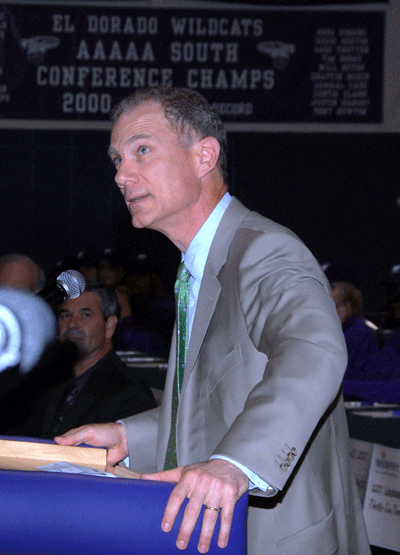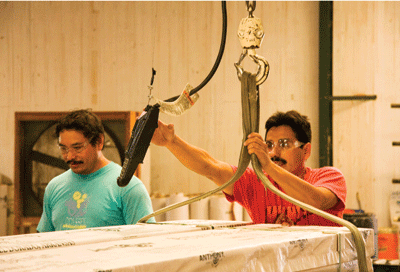Community Profile: El Dorado Hopes The Promise Brings Back the Golden Days
Photo Gallery | Article
Photo Gallery

Graduates from El Dorado High School show off their "Promise" scholarships last May. (Photo from the Diamond Agency)

Claiborne Deming, president of Murphy Oil Corp., congratulates the high school graduates last May. Murphy made the college scholarships possible through its El Dorado Promise program. (Photo from the Diamond Agency)

This oil pump, a freshly painted relic of the boom days, produces about a barrel a day from an old well alongside Highway 82. Photo by Susan C. Thomson

Banners on streetlights remind passers-by of the golden years of El Dorado. Photo by Susan C. Thomson

Twenty years ago, downtown was boarded up. Today, thanks in large part to oil entrepreneur Richard Mason and his wife, Vertis, downtown is a picture postcard version of what it looked like when El Dorado was nicknamed “Boomtown” in the early part of the 20th century. Photo by Susan C. Thomson

At Anthony Forest Products, Jeazon Fuentes uses a hoist to move laminated beams that have been wrapped for shipping. At left is Juan Buenrostro. Photo by Susan C. Thomson

The Lion Oil Co. refinery processes local oil, as well as offshore oil and foreign crude. The site will be expanded again this year. Photo from the Diamond Agency
El Dorado, Ark., and the area around it are naturally rich in pine forests, salt water and oil. Now, the town is seeking to capitalize on a new resource—education. In January 2007, Murphy Oil Corp., the community’s signature employer, announced that it was setting aside $50 million to endow the El Dorado Promise, a program that offers grants to graduates of El Dorado High School so that they can attend college.
“That started the ball rolling,” Mayor Mike Dumas says. “That changed the whole attitude of the community.”
He and other leaders in El Dorado (rhymes with “tornado”) credit the Promise for energizing townspeople to approve later that year a one-cent sales tax for economic development and the town’s first school tax increase in 31 years.
They voted “yes” though times were hard for many. The local unemployment rate was hovering about two points above the national average. Luther Lewis, chief executive at the Medical Center of South Arkansas, says bad debt was rising at the hospital and more patients were qualifying for Medicaid.
The town’s once-bedrock manufacturing industry was eroding and taking its toll. In 2003, lighting manufacturer Prescolite Inc. pulled out of El Dorado, moving the work of its 270 employees to Mexico. Two years later, Cooper-Standard Automotive closed its local vehicle-parts plant and consolidated production in Auburn, Ind., eliminating another400 jobs.
Don Wales, chief executive of the El Dorado Chamber of Commerce, says it had long been obvious that outsized employee fringe benefits made the Cooper-Standard plant uncompetitive. He puts the town’s Pilgrim’s Pride chicken-processing plant in that same precarious category, given its history of labor-management and productivity problems.
As chicken processing evolved into a big business, that plant grew accordingly—into a linchpin of the local economy. Now, it too is threatened. Late last summer—as part of a drastic overhaul that was prompted by spiking feed and fuel costs, an oversupply of processed chickens and mounting corporate red ink—Pilgrim’s Pride cut its El Dorado work force by 700.
With a payroll of 1,000 left, Pilgrim’s Pride remains the largest local employer. But for how long? A spokesman declined to elaborate on the company’s notice last spring that it was considering the plant for possible shutdown. Last month, the company filed for protection from its creditors under Chapter 11 of the U.S. Bankruptcy Code.
Fortunately, the natural-resource industries remain, of necessity, rooted in place. The forests feed a lumber industry that began just after the Civil War. After decades of industry consolidation, Deltic Timber Corp. and Anthony Forest Products Co., the largest surviving companies, are bucking a slowdown caused by the steep drop-off in U.S. home building. Aubra Anthony Jr., president of his family’s company, takes the long view. Timber will come back, he says, “because of its increasing value not only for traditional building products and fiber for paper but also for the emerging biofuels industry and cellulosic ethanol.”
El Dorado, just 14 miles north of the Louisiana border, lies over one of two commercially viable salt water reserves in the world, the Dead Sea being the other. Chemtura, the largest of three chemical plants in town, pumps that water, or brine, from the ground and uses the bromine it extracts from it to make products such as fire retardants and chemicals for use in oil drilling, water treatment and agriculture.
Plans are afoot for the leftover brine. Texas-based Tetra Technologies Inc. has broken ground nearby for a $110 million plant that is expected to employ about 80 people when in full production at the end of this year. It will buy brine from Chemtura and process it into calcium chloride, whose uses include controlling pressure in oil and gas drilling, curing cement, processing food and melting ice and snow.
No commodity, though, has so driven and defined the town over the years as oil. Its discovery in the area in 1921 set off an explosion in population and wealth that lasted through that decade and earned El Dorado its enduring nickname—Boomtown.
A rough version of the original boomtown survives in a downtown that was largely boarded up 20 years ago. It is now a picture-postcard vision of rehabbed storefronts and old-time kiosks, clocks, streetlights and telephone booths. Oil entrepreneur Richard Mason and his wife, Vertis, spearheaded the transformation by investing their own money. Other investors followed, as did Main Street El Dorado, an organization that raises money for improvements downtown and that stages events there. The Downtown Business Association is also a big promoter these days.
Recently, oil has been enjoying what Rodney Landes, president of El Dorado’s First Financial Bank, describes as a “mini-boom.” As world oil prices soared in 2008, small operators found profits in reworking old fields for deeply embedded oil. In doing so, they put hundreds to work and provided “a significant boost” to the local economy, he says.
Most of the local oil—along with offshore and foreign crude—passes through the Lion Oil Co. refinery. An El Dorado fixture since the go-go 1920s, it turns out gasoline that is sold in Arkansas and 14 other states. The company has invested several million dollars to double its capacity over the past 20 years and plans to expand it again this year, Vice President Steven M. Cousins says.
By far, the community’s biggest name in oil is Murphy. By virtue of its $25 billion in annual revenue, Fortune magazine ranked the company the nation’s 134th largest in 2008. Murphy Oil sells gasoline at Wal-Marts in 20 states and explores for oil and gas all over the world, though nowhere near El Dorado. Yet, loyal to its beginning in the region a century ago, the company maintains its headquarters here and is treasured as the city’s largest white-collar employer.
Claiborne P. Deming, who retired as Murphy’s president last month, says the Promise was motivated by the company’s desire “to give kids an opportunity to go away and take advantage of their ability.” As a plus, he adds, the company saw it as a potential lure to professionals, who are sometimes difficult for employers to attract to small, rural Southern towns.
Depending on how long they’ve been attending El Dorado public schools, graduates are promised up to the highest tuition at an Arkansas public university—$3,252 a semester this year. They can spend the money at any two- or four-year, public or private, in-state or out-of-state college or university.
The offer was an instant hit. Of the high school’s 271 graduates that first year, 224, or 83 percent, went to college, compared with the usual 60 percent. Results were similar in 2008. James Fouse, the school district official who directs the Promise, says it has expanded the college options of many students.
For others, it has provided their only opportunity. Senior Paul Lowery, for instance, is the oldest of three siblings. He always wanted to go to college but wasn’t always sure he’d be able to—until the Promise. “I can go now,” he beams. This fall, he expects to enroll at the University of Arkansas.
Deming says the Promise has given El Dorado “a nice sense of pulling together and moving forward.” Landes envisions it as “a tie breaker” that can work in the city’s favor in attracting new business.
Don Hale, president of the advertising agency that promotes El Dorado tourism, predicts the Promise will succeed in attracting both new businesses and residents.
The school district, which had been losing between 80 and 100 students a year for the 20 years before the Promise, is already crediting it for an uptick in enrollment—149 more students in 2007 and 50 more in 2008.
Soon, El Dorado taxpayers will start seeing physical evidence of their Promise-inspired largesse.
The new sales tax, which went into effect July 1, 2007, is expected to generate $32-$34 million before expiring in 2015. Some of the money is earmarked to develop a total of 1,800 undeveloped acres in two locations for prospective new businesses and to turn the 116,000-square-foot building Prescolite abandoned into a small-business development center.
With the biggest piece of the proceeds—about $17-$18 million—the city plans to build a conference center. At 51,000 square feet, it will be the largest meeting space in southern Arkansas and a magnet for out-of-town, as well as local, groups, Dumas says.
The additional school tax money will finance a $45 million high school to replace the current one, built in the late 1960s.
Groundbreakings for both the new conference center and the new high school are scheduled for this spring.
Views expressed in Regional Economist are not necessarily those of the St. Louis Fed or Federal Reserve System.
For the latest insights from our economists and other St. Louis Fed experts, visit On the Economy and subscribe.
Email Us

